牛津译林版中考英语宾语从句专题课件(81张PPT)
文档属性
| 名称 | 牛津译林版中考英语宾语从句专题课件(81张PPT) | 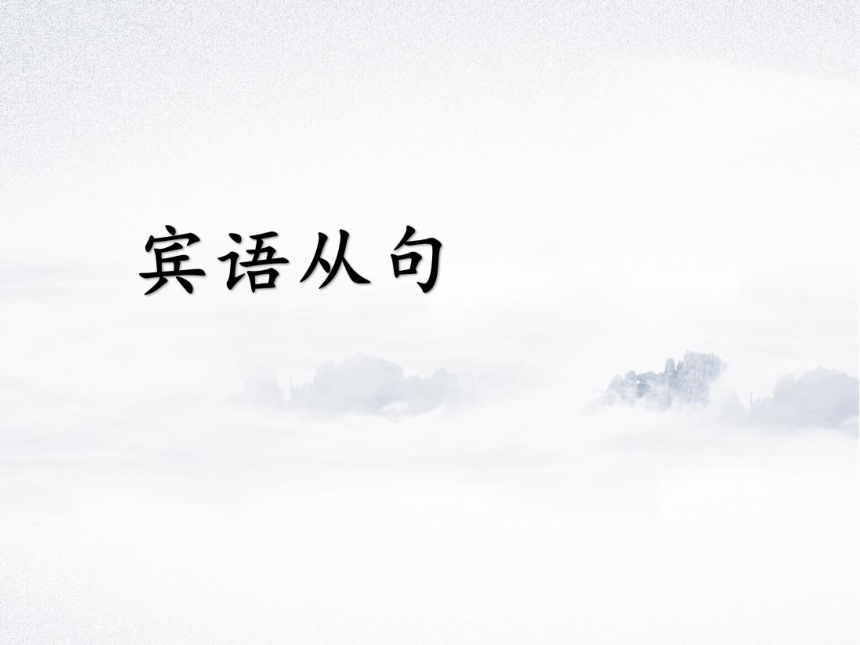 | |
| 格式 | ppt | ||
| 文件大小 | 5.9MB | ||
| 资源类型 | 试卷 | ||
| 版本资源 | 牛津译林版 | ||
| 科目 | 英语 | ||
| 更新时间 | 2021-04-01 15:56:56 | ||
图片预览

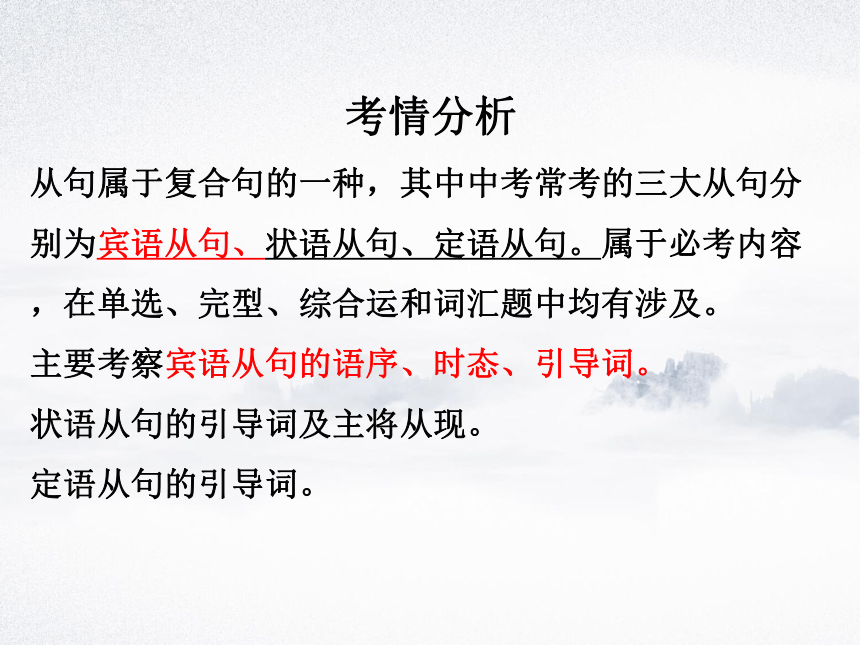
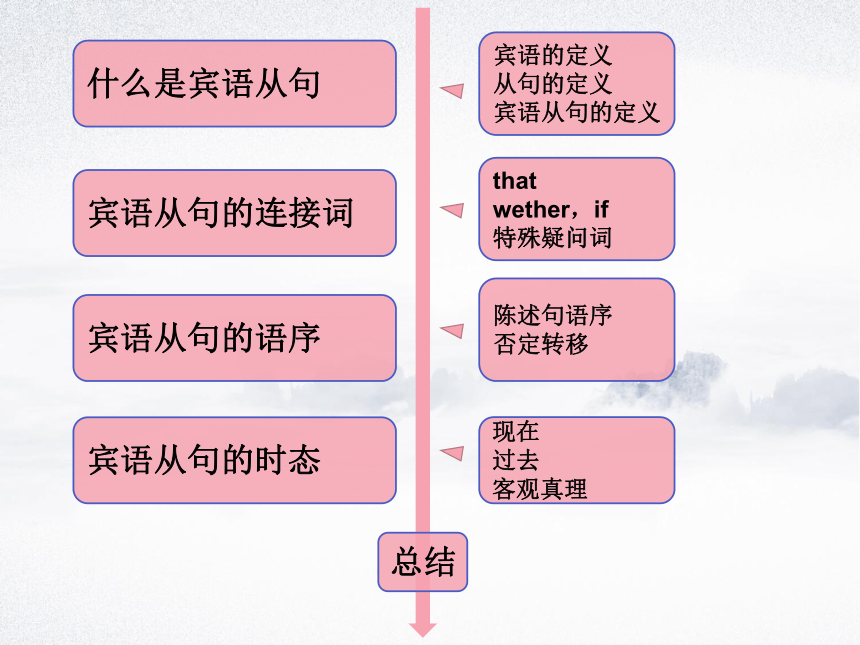
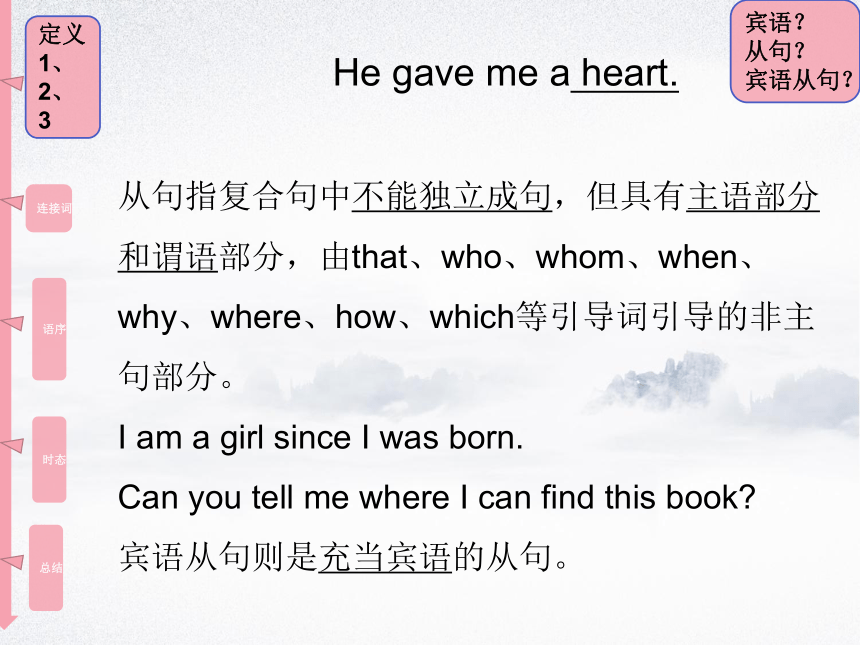
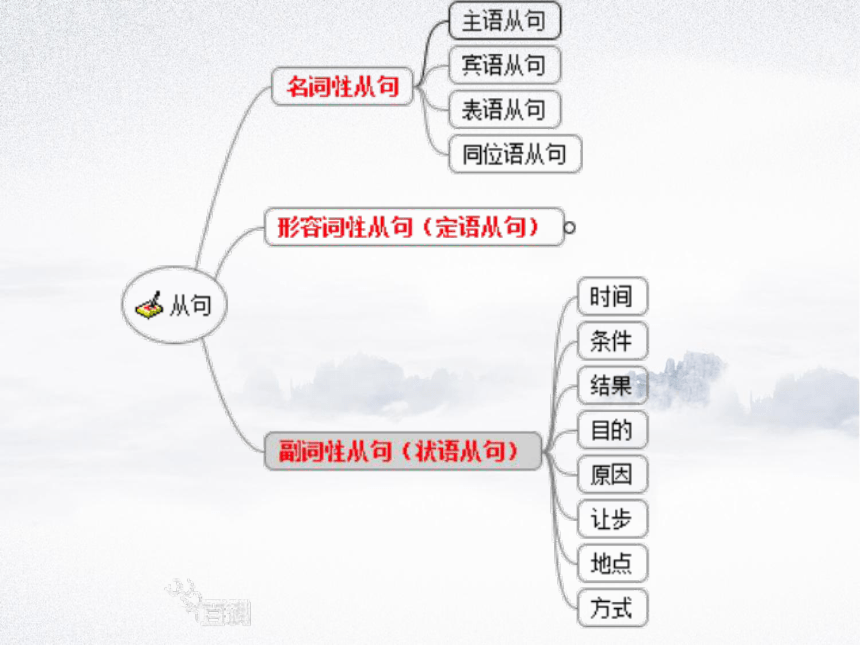
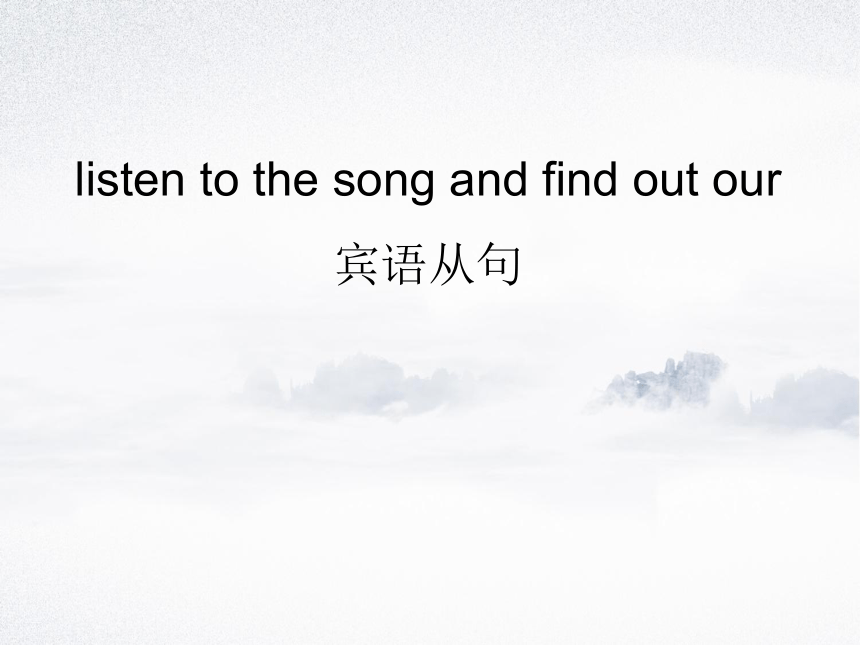
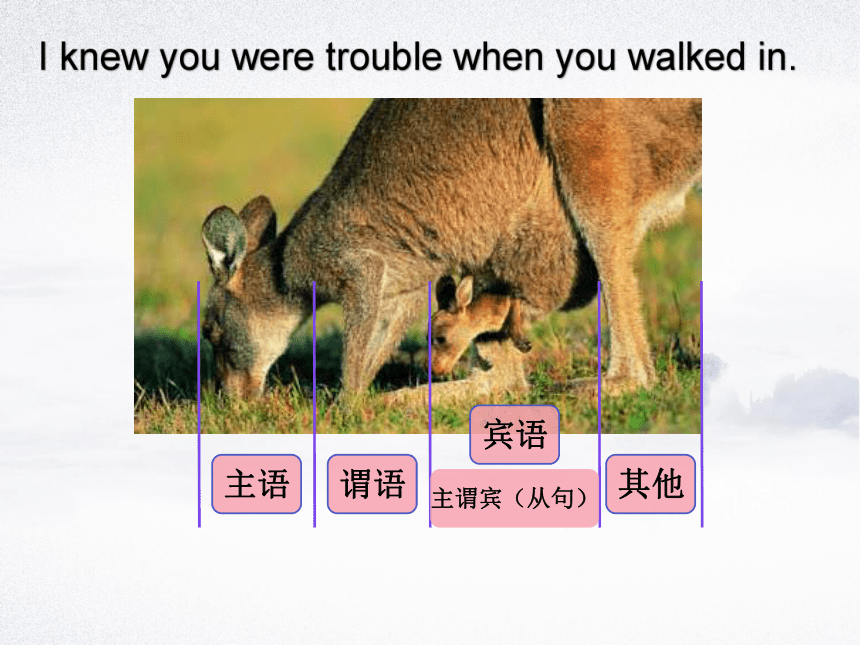
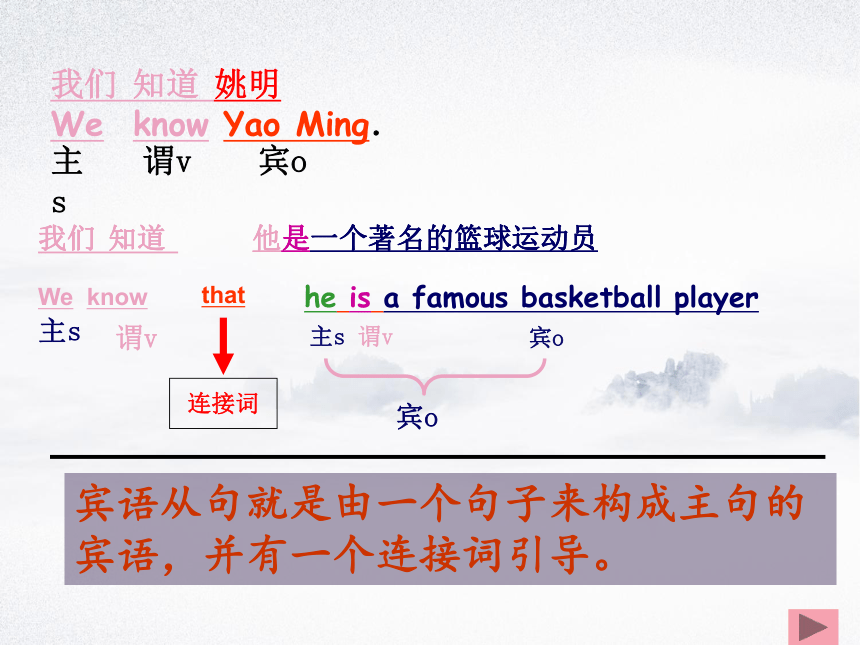
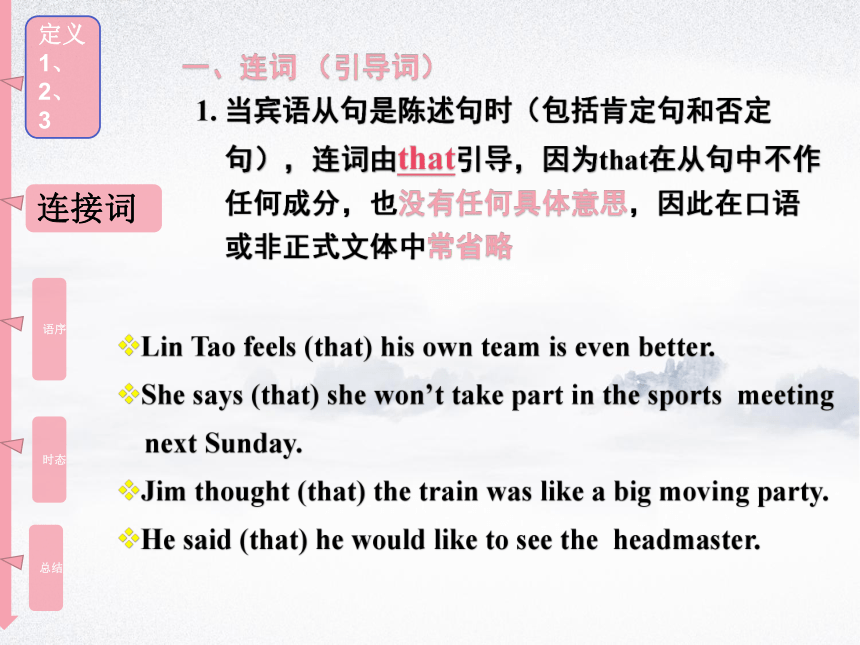
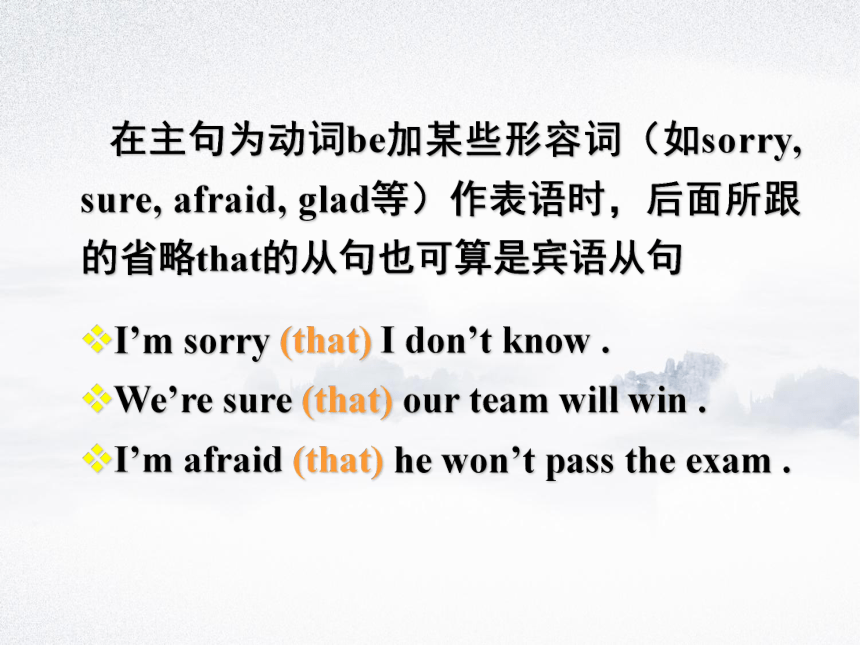
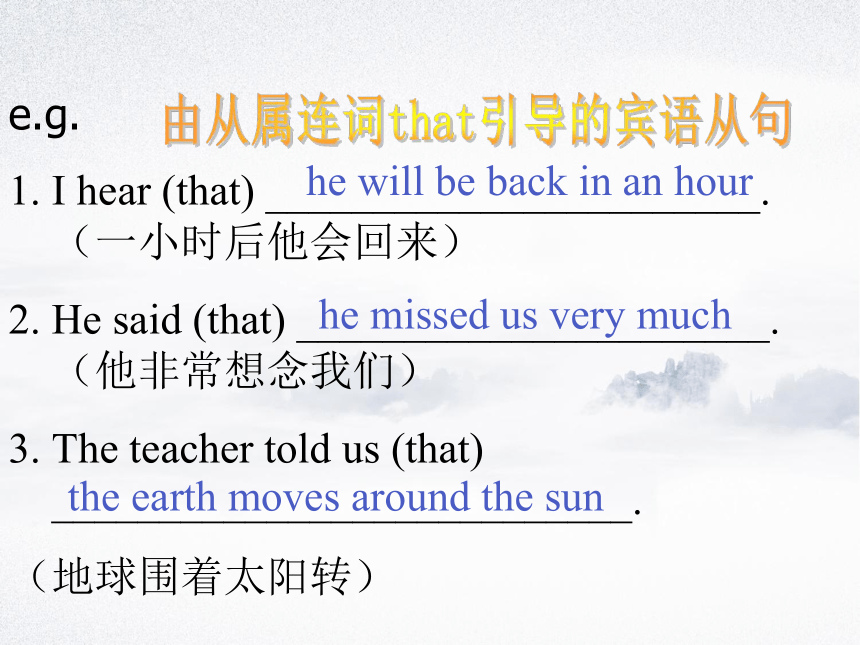
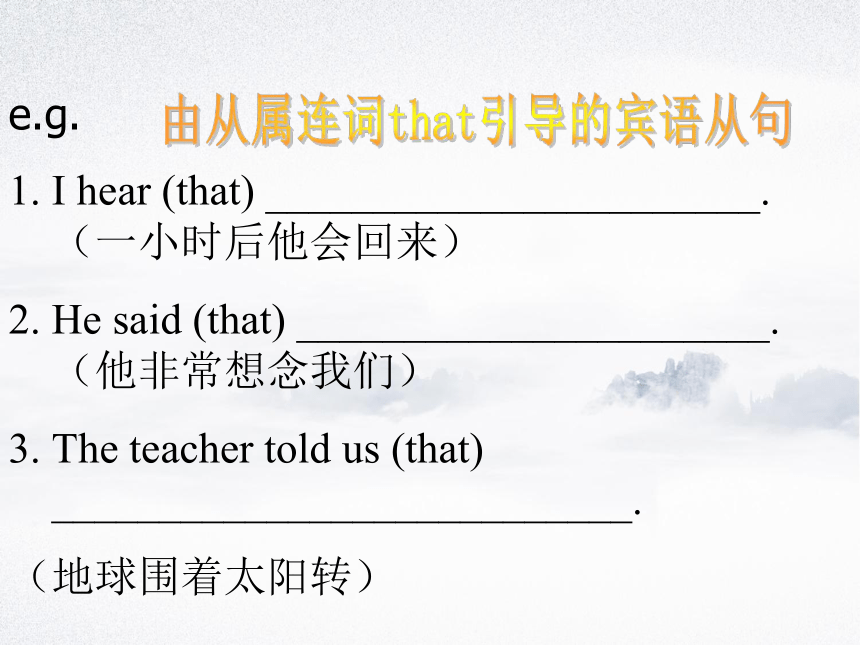
文档简介
(共78张PPT)
考情分析
从句属于复合句的一种,其中中考常考的三大从句分别为宾语从句、状语从句、定语从句。属于必考内容,在单选、完型、综合运和词汇题中均有涉及。
主要考察宾语从句的语序、时态、引导词。
状语从句的引导词及主将从现。
定语从句的引导词。
什么是宾语从句
宾语从句的语序
宾语从句的时态
宾语从句的连接词
宾语的定义
从句的定义
宾语从句的定义
that
wether,if
特殊疑问词
陈述句语序
否定转移
现在
过去
客观真理
总结
定义
1、
2、
3
连接词
语序
时态
总结
宾语?
从句?
宾语从句?
He gave me a heart.
从句指复合句中不能独立成句,但具有主语部分和谓语部分,由that、who、whom、when、why、where、how、which等引导词引导的非主句部分。
I am a girl since I was born.
Can you tell me where I can find this book
宾语从句则是充当宾语的从句。
listen to the song and find out our
宾语从句
主语
谓语
宾语
主谓宾(从句)
其他
我们 知道 姚明
We know Yao Ming.
我们 知道 他是一个著名的篮球运动员
We know
宾语从句就是由一个句子来构成主句的宾语,并有一个连接词引导。
宾o
宾o
主s
谓v
he is a famous basketball player
主s
谓v
宾o
that
连接词
我们 知道 他是一个著名的篮球运动员
谓v
主s
定义
1、
2、
3
连接词
语序
时态
总结
一、连词 (引导词)
1. 当宾语从句是陈述句时(包括肯定句和否定
句),连词由that引导,因为that在从句中不作
任何成分,也没有任何具体意思,因此在口语
或非正式文体中常省略
在主句为动词be加某些形容词(如sorry, sure, afraid, glad等)作表语时,后面所跟的省略that的从句也可算是宾语从句
I’m sorry (that) I don’t know .
We’re sure (that) our team will win .
I’m afraid (that) he won’t pass the exam .
e.g.
I hear (that) _______________________. (一小时后他会回来)
He said (that) ______________________. (他非常想念我们)
The teacher told us (that) ___________________________.
(地球围着太阳转)
he will be back in an hour
he missed us very much
the earth moves around the sun
e.g.
I hear (that) _______________________. (一小时后他会回来)
He said (that) ______________________. (他非常想念我们)
The teacher told us (that) ___________________________.
(地球围着太阳转)
e.g.
I hear (that) _______________________. (一小时后他会回来)
He said (that) ______________________. (他非常想念我们)
The teacher told us (that) ___________________________.
(地球围着太阳转)
he will be back in an hour
he missed us very much
the earth moves around the sun
练一练
1.This is a book.
2.You like singing.
3.He worked last night.
4.They will go home.
5.Jim has been to Beijing.
6.She sings well.
用以下开头与下列句子连成宾语从句:
1. I know …
2. She says …
3. Tell your friend …
(that)
定义
1、
2、
3
连接词
语序
时态
总结
连词 (引导词)
1、that
2、weather、if -是否
3、特殊疑问词
一般疑问句做宾语
我问他是否想去游泳
I ask
Does he want to go swim
一般疑问句做宾语
我问他是否想去游泳
1, 改为陈述句语气,
2,用if/whether连接
I ask
Does he want to go swim
he wants to go swim.
If/whether
I ask
由if或whether引导的宾语从句。If和whether在句中的意思是“是否”。例如:
I want to know if (whether) he lives there.
He asked me whether (if) I could help him.
but, 任何事情都会有
注意以下情况只用whether,不用if。
1. whether引导的从句常可以与连词or或or not直接连用。如:
Let me know whether you can come or not.
Let me know if you can come or not.
2. 当宾语从句提到句首时,只能用whether引导。如:
Whether it is true or not, I can’t tell.
If it is true or not, I can’t tell.
3. whether可以引导带to的不定式。如:
I don’t know whether to accept or refuse.
I don’t know if to accept or refuse.
4. whether及其引导的成分可放于介词之后,作介词的宾语。如:
I worry about whether I hurt her feelings.
I worry about if I hurt her feelings.
So, whether 比 if 更万能啊!
练一练
1.Is he reading or not
2.Do you get up at six or seven
3.Does Tom work hard
4.Did you watch TV
5.Will they read books or not
用以下开头与下列句子连成宾语从句:
1.Do you know …
2.I want to know …
3.The teacher asks …
if/whether
定义
1、
2、
3
连接词
时态
总结
连词 (引导词)
1、that
2、weather、if -是否
3、特殊疑问词--下回分解,留空
(三)宾语从句的语序
句子的两种语序:
1.陈述句结构叫陈述语序
2 疑问句结构叫疑问语序
宾语从句必须用 ________
There is a shop near here.
Is there a shop near here
(三)宾语从句的语序
句子的两种语序:
1.陈述句结构叫陈述语序
2 疑问句结构叫疑问语序
宾语从句必须用 ________
陈述语序
There is a shop near here.
Is there a shop near here
练习:将下列句子改成陈述句语序:
1.Is there a bank near here
2.Is it on Fifth Avenue
3.Are they doing homework
练习:将下列句子改成陈述句语序:
1.Is there a bank near here
2.Is it on Fifth Avenue
3.Are they doing homework
There is a bank near here
It is on Fifth Avenue
They are doing homework
4.Does she work in a hospital
5.Did you go to Center Park
6.Do we have to wear a uniform
7.Can we wear hats in school
4.Does she work in a hospital
5.Did you go to Center Park
6.Do we have to wear a uniform
she works in a hospital
you went to Center Park
we have to wear a uniform
we can wear hats in school
7.Can we wear hats in school
定义
1、
2、
3
时态
总结
连词 (引导词)
1、that
2、weather、if -是否
3、特殊疑问词
特殊疑问句做宾语
我想知道你最喜欢哪一条领带?
Which tie do you like best
特殊疑问句变成 陈述语序
连接词就是疑问词本身
I wonder
I wonder
ATTENTION
which tie you like best
Do you know where _____ from (he,come)
Can you tell me which_________to the park ( be the way)
I don't know who talk with.(我可以)
He wants to go where comfortable with.
(他觉得)
he comes
is the way
I can
he feels
定义
1、
2、
3
连接词
语序
时态
总结
宾语从句
lesson 2
定义
1、
2、
3
连接词
语序
时态
总结
主语+谓语+连接词+宾语(主谓宾+其他)
主句
从句
宾语从句
lesson 2
定义
1、
2、
3
连接词
语序
总结
主语+谓语+连接词+宾语(主谓宾+其他)
陈述性语序:主+谓(名词+动词)
时态
1. Tell me where _ __
A. is the hospital B. the hospital is
C. is hospital D. hospital is
2. He hasn’t decided _______.
A. if he’ll go on a trip to WZ B. when will he go on a trip to WZ C. if he goes on a trip to WZ D. when does he go on a trip to WZ
3. Can you see ________
A. what he’s reading B. what is he reading
C. what does he read D. he reads what
Could you tell me __________
A. where do you live
B. who you are waiting for
C. who were you waiting for
D. where you live in
He found hard to finish the work in such a short time .
A that B this C there D it
定义
1、
2、
3
连接词
语序
总结
时态
确定从句的时态(根据主句时态)
主句时态
从 句 时 态
连 接 前
连 接 后
一般现在时
时态保持不变
一般过去时
一般现在时
一般过去时
一般过去时
过去完成时
一般将来时
过去将来时
现在进行时
过去进行时
现在完成时
过去完成时
直接陈述句: Ms Lu says, “I am a nice girl.
间接陈述句: Ms Lu says she is a nice girl.
重在理解!
笔记只是帮助你回忆的!
he says/complain/assure/promise/think
he can make a good teacher.
everyday
he says.
he can make a good teacher.
yesterday
he said.
he can make a good teacher.
last year
he said.
he can make a good teacher.
next year
he said.
he can make a good teacher.
now
he said.
he can make a good teacher.
now
he said.
he can make a good teacher.
for 5 years
四.宾语从句中时态的变化
I hear (that)
Jim ( be ) a worker two years ago.
Jim ( be ) an English teacher now .
Jim ( cook ) dinner tomorrow .
Jim ( sing )a popular song now.
Jim ( be ) to the Great Wall twice . Jim ( play ) basketball when his father came back.
Jim ( learn )1000 Chinese words by the end of last semester.
填一填
was
is
will cook
is singing
has been
was playing
had learned
1.当主句是一般现在时,宾语从句的时态不作限制,我们可以根据句子的需要使用任何一种时态。
(需要性原则)
2.当主句是一般过去时的时候,宾语从句必须运用相应的过去的某一种时态,从而达到主句和从句的相互一致。(呼应性原则)
1) He will go to Hong Kong .
2) He is sick.
3) He is reading a book .
4) He has finished his work.
1) He to Hong Kong .
2) He sick.
3) He a book .
4) He
He said
辨一辨
would go
was
was reading
his work.
had finished
四.宾语从句中时态的变化2
3.当宾语从句说明的是客观存在的事实或者是客观存在的真理时,就不用受到主句时态的限制,仍是用一般现在时态。(特殊性原则)
ATTENTION
He told me (that)
Summer after Spring .
is
I was told (that)
the sun much bigger than the moon.
is
the sun much bigger than the moon.
no news good news.
My parents told me (that)
is
Ⅰ.Find out the mistakes and correct them.
1 Could you tell me where do they live
2 She knew that Danny is a student.
3 He told me that winter was colder than autumn.
4 Do you know who car it is
找错误
was
is
whose
宾语从句三要素
引导词
that(陈述句 )
if/whether(一般疑问句 )
特殊疑问词(特殊疑问句)
时态
主句为一般现在时从句可为任何时态
主句为一般过去时
从句
一般过去时
过去将来时
过去进行时
过去完成时
语序
宾语从句的语序都为陈述句语序
客观真理 自然现象
公式定理 名言警句 时态不变
七.本课小结
1.Do you know __________________
A. where does she live B. she lives where
C. where she lives D. where she live
2. His parents wanted to know what he ______at that time.
A. is doing B. was doing C. has done D. will do
C
B
I.从下列A、B、C、D中选择一个正确选项填空。
4.Lily’s mother looked for her for half an hour, but could not find ________
what Lily was B. what was Lily
C. where Lily was D. where was Lily
C
3.—We don’t know ______.
-- It is said that he was born in Canada.
what he is B. when he was born
C. where he comes from D. if he lives here
C
5 The girls asked if they ____ some food and drink with them.
A. took B. take C. takes D. will take
6 Linda said the moon___ round the earth.
A. travelled B. has travelled C. travels D. had travelled
A
C
7. Could you please tell me ________ he will come here tomorrow
A. if B. weather C. what D. which
8. Could you tell me ___
A. when will they leave Beijing
B. when would they leave Beijing
C. when they will leave Beijing
D. when did they leave Beijing
C
II.改错:
1.Miss Zhang asked me why was I late for school.
__________________________________________
Miss Zhang asked me why I was late for school.
2.Father told me the sun always rose in the east.
__________________________________________
Father told me the sun always rises in the east.
3.He doesn’t know that when she can come back.
__________________________________________
He doesn’t know when she can come back.
Ⅲ.完成句子。
1. I hear (that) he ______________ in an hour.
( 我听说他一小时后回来。)
will be back
2. He said (that) he ______________ very much.
(他说他非常想念我们。)
missed us
3. Ask him ____________________.
(问问他是否能来。)
If /whether he can come
4. Can you tell me ____________________.
(你能告诉我昨晚他在哪儿吗?)
where he was last night
宾 语 从 句 小 结
一.结构
1. 当陈述句作宾语从句时, 结构:主句+that + 主语 +谓语部分
2. 当一般疑问句作宾语从句时,结构:主句+ if(whether) +主语 +谓语部分
3.当 特殊疑问句作宾语从句时,结构:主句+特殊疑问词+主语 +谓语部分
二.主从时态关系(间接引语)
主句 从句
1.一般现在时
2. 一般过去时
3.(特殊):任何时态 (客观、自然现象)
三.语序:陈述语序
时态不变
时态相应变化
一般现在时
状语从句预习
lesson 3 状语从句
1、时间状语从句
2、条件状语从句
3、原因状语从句
4、目的状语从句
5、结果状语从句
6、让步状语从句
引导词
结构
时态
时间状语从句
由以下连词引导:when, while, as, after, before, as soon as, since, till /until, by the time
在时间状语从句中,要注意时态一致。一般情况下主句是将来时的时候,从句要用一般现在时(主将从现)。
结构:
主句(主谓宾)+引导词+从句(主谓宾)
1.when当...的时候(可延续/不可延续)
Mozart started writing music when he was four years old.
(当)莫扎特4岁的时候,开始写音乐作品。
He could even write when was eating.
2.while当...时(只用于可延续)
He visited a lot of places while he was traveling.
他在旅途中参观了许多地方。
He came home while Mozart was playing the piano.
3.as在...的同时;一边...一边...
He smiled as he stood up.
他一边站起来一边笑着。
4.由when, while, as引导的时间状语从句。
例如:
When you think you know nothing, then you begin to know something.
当你以为自己一无所知的时候,你就是在开始知道一些事物了。
Strike while the iron is hot. 趁热打铁。
You can feel the air moving as your hand pushes through it.
当你的手在空气中挥动的时候,你就能感觉到空气在流动。
Our headmaster laughed as she spoke.我们的校长边谈边笑。
when while as 有何不同?
as when while都表示主、从句动作同时发生,三者差异如下:
表示“一边。。。一边"的意思
as
强调两个动作同时进行,并表示对比时,用于发生时间较短时
when
1、还可以表示从句动词的动作在主几句动词的动作"之前 "或"之后"发生。
2、when=and then; at that moment (正在那个时候)
while
1、用于时间较长时
2、 强调两个动作同时进行,并表示对比时
有时这三个连词可以互换,有时不可以。
It was raining hard when (as) I got there.
我到那里时,正在下大雨。
( 动作同时发生,when可换为as, 但不能换为while,因为get不可延
When I had read the article, he called me.
我看完这篇文章之后,她给我打了电话。( 从句动作发生在主句之前,注意时态表达,只能用when )
When I got to the cinema, the film had begun.
(当)我到了电影院时,电影已经开演了。(从句的动作发生在主句之后,只能用when,并要注意时态)
while, as不能代替
She thought I was talking about her daughter, while, in fact, I was talking about my daughter.
他以为我在谈她女儿,然而,实际上在谈论我女儿。(表转折,对比,when, as都不能代替它)
While the alien was buying a souvenir, the girl called the police.
从句不可延,用while
all in all
when最万能
while还有延伸的“然而”的意思
5.after在...之后
He left the classroom after he had finished his homework the other day.
前几天做完作业之后回的家。
after
过去的过去
过去
5.before 在...之前
Mr. Brown had worked in a bank for a year before he came here.
布朗先生来这之前已经在一家银行里工作一年了。
before
过去的过去
过去
6.as soon as 一...就...
We began to work as soon as we got there.
我们一到那就开始工作。
I will write to you as soon as I get home.
我一到家就给你写信。
7.since 自。。。以来 到现在表示自过去的一个起点时间到目前(说话时间)为止的一段持续时间。主句一般用现在完成时,从句用一般过去时。Mr Green has taught in that school since he came to China three years ago.
本句从句还可以用短语:since three years ago(自三年前以来)表示。)
8 till /until都可以作连词,连接时间状语,也可以作介词,与其它词构成介词短语,在句中作状语。
They walked till /until it was dark.
Xiao Ming didn’t leave home till / until his father came back.
9. by the time 到。。。为止
By the time he gets there , his father has already gone.
By the time I got to school, the class had already began.
考情分析
从句属于复合句的一种,其中中考常考的三大从句分别为宾语从句、状语从句、定语从句。属于必考内容,在单选、完型、综合运和词汇题中均有涉及。
主要考察宾语从句的语序、时态、引导词。
状语从句的引导词及主将从现。
定语从句的引导词。
什么是宾语从句
宾语从句的语序
宾语从句的时态
宾语从句的连接词
宾语的定义
从句的定义
宾语从句的定义
that
wether,if
特殊疑问词
陈述句语序
否定转移
现在
过去
客观真理
总结
定义
1、
2、
3
连接词
语序
时态
总结
宾语?
从句?
宾语从句?
He gave me a heart.
从句指复合句中不能独立成句,但具有主语部分和谓语部分,由that、who、whom、when、why、where、how、which等引导词引导的非主句部分。
I am a girl since I was born.
Can you tell me where I can find this book
宾语从句则是充当宾语的从句。
listen to the song and find out our
宾语从句
主语
谓语
宾语
主谓宾(从句)
其他
我们 知道 姚明
We know Yao Ming.
我们 知道 他是一个著名的篮球运动员
We know
宾语从句就是由一个句子来构成主句的宾语,并有一个连接词引导。
宾o
宾o
主s
谓v
he is a famous basketball player
主s
谓v
宾o
that
连接词
我们 知道 他是一个著名的篮球运动员
谓v
主s
定义
1、
2、
3
连接词
语序
时态
总结
一、连词 (引导词)
1. 当宾语从句是陈述句时(包括肯定句和否定
句),连词由that引导,因为that在从句中不作
任何成分,也没有任何具体意思,因此在口语
或非正式文体中常省略
在主句为动词be加某些形容词(如sorry, sure, afraid, glad等)作表语时,后面所跟的省略that的从句也可算是宾语从句
I’m sorry (that) I don’t know .
We’re sure (that) our team will win .
I’m afraid (that) he won’t pass the exam .
e.g.
I hear (that) _______________________. (一小时后他会回来)
He said (that) ______________________. (他非常想念我们)
The teacher told us (that) ___________________________.
(地球围着太阳转)
he will be back in an hour
he missed us very much
the earth moves around the sun
e.g.
I hear (that) _______________________. (一小时后他会回来)
He said (that) ______________________. (他非常想念我们)
The teacher told us (that) ___________________________.
(地球围着太阳转)
e.g.
I hear (that) _______________________. (一小时后他会回来)
He said (that) ______________________. (他非常想念我们)
The teacher told us (that) ___________________________.
(地球围着太阳转)
he will be back in an hour
he missed us very much
the earth moves around the sun
练一练
1.This is a book.
2.You like singing.
3.He worked last night.
4.They will go home.
5.Jim has been to Beijing.
6.She sings well.
用以下开头与下列句子连成宾语从句:
1. I know …
2. She says …
3. Tell your friend …
(that)
定义
1、
2、
3
连接词
语序
时态
总结
连词 (引导词)
1、that
2、weather、if -是否
3、特殊疑问词
一般疑问句做宾语
我问他是否想去游泳
I ask
Does he want to go swim
一般疑问句做宾语
我问他是否想去游泳
1, 改为陈述句语气,
2,用if/whether连接
I ask
Does he want to go swim
he wants to go swim.
If/whether
I ask
由if或whether引导的宾语从句。If和whether在句中的意思是“是否”。例如:
I want to know if (whether) he lives there.
He asked me whether (if) I could help him.
but, 任何事情都会有
注意以下情况只用whether,不用if。
1. whether引导的从句常可以与连词or或or not直接连用。如:
Let me know whether you can come or not.
Let me know if you can come or not.
2. 当宾语从句提到句首时,只能用whether引导。如:
Whether it is true or not, I can’t tell.
If it is true or not, I can’t tell.
3. whether可以引导带to的不定式。如:
I don’t know whether to accept or refuse.
I don’t know if to accept or refuse.
4. whether及其引导的成分可放于介词之后,作介词的宾语。如:
I worry about whether I hurt her feelings.
I worry about if I hurt her feelings.
So, whether 比 if 更万能啊!
练一练
1.Is he reading or not
2.Do you get up at six or seven
3.Does Tom work hard
4.Did you watch TV
5.Will they read books or not
用以下开头与下列句子连成宾语从句:
1.Do you know …
2.I want to know …
3.The teacher asks …
if/whether
定义
1、
2、
3
连接词
时态
总结
连词 (引导词)
1、that
2、weather、if -是否
3、特殊疑问词--下回分解,留空
(三)宾语从句的语序
句子的两种语序:
1.陈述句结构叫陈述语序
2 疑问句结构叫疑问语序
宾语从句必须用 ________
There is a shop near here.
Is there a shop near here
(三)宾语从句的语序
句子的两种语序:
1.陈述句结构叫陈述语序
2 疑问句结构叫疑问语序
宾语从句必须用 ________
陈述语序
There is a shop near here.
Is there a shop near here
练习:将下列句子改成陈述句语序:
1.Is there a bank near here
2.Is it on Fifth Avenue
3.Are they doing homework
练习:将下列句子改成陈述句语序:
1.Is there a bank near here
2.Is it on Fifth Avenue
3.Are they doing homework
There is a bank near here
It is on Fifth Avenue
They are doing homework
4.Does she work in a hospital
5.Did you go to Center Park
6.Do we have to wear a uniform
7.Can we wear hats in school
4.Does she work in a hospital
5.Did you go to Center Park
6.Do we have to wear a uniform
she works in a hospital
you went to Center Park
we have to wear a uniform
we can wear hats in school
7.Can we wear hats in school
定义
1、
2、
3
时态
总结
连词 (引导词)
1、that
2、weather、if -是否
3、特殊疑问词
特殊疑问句做宾语
我想知道你最喜欢哪一条领带?
Which tie do you like best
特殊疑问句变成 陈述语序
连接词就是疑问词本身
I wonder
I wonder
ATTENTION
which tie you like best
Do you know where _____ from (he,come)
Can you tell me which_________to the park ( be the way)
I don't know who talk with.(我可以)
He wants to go where comfortable with.
(他觉得)
he comes
is the way
I can
he feels
定义
1、
2、
3
连接词
语序
时态
总结
宾语从句
lesson 2
定义
1、
2、
3
连接词
语序
时态
总结
主语+谓语+连接词+宾语(主谓宾+其他)
主句
从句
宾语从句
lesson 2
定义
1、
2、
3
连接词
语序
总结
主语+谓语+连接词+宾语(主谓宾+其他)
陈述性语序:主+谓(名词+动词)
时态
1. Tell me where _ __
A. is the hospital B. the hospital is
C. is hospital D. hospital is
2. He hasn’t decided _______.
A. if he’ll go on a trip to WZ B. when will he go on a trip to WZ C. if he goes on a trip to WZ D. when does he go on a trip to WZ
3. Can you see ________
A. what he’s reading B. what is he reading
C. what does he read D. he reads what
Could you tell me __________
A. where do you live
B. who you are waiting for
C. who were you waiting for
D. where you live in
He found hard to finish the work in such a short time .
A that B this C there D it
定义
1、
2、
3
连接词
语序
总结
时态
确定从句的时态(根据主句时态)
主句时态
从 句 时 态
连 接 前
连 接 后
一般现在时
时态保持不变
一般过去时
一般现在时
一般过去时
一般过去时
过去完成时
一般将来时
过去将来时
现在进行时
过去进行时
现在完成时
过去完成时
直接陈述句: Ms Lu says, “I am a nice girl.
间接陈述句: Ms Lu says she is a nice girl.
重在理解!
笔记只是帮助你回忆的!
he says/complain/assure/promise/think
he can make a good teacher.
everyday
he says.
he can make a good teacher.
yesterday
he said.
he can make a good teacher.
last year
he said.
he can make a good teacher.
next year
he said.
he can make a good teacher.
now
he said.
he can make a good teacher.
now
he said.
he can make a good teacher.
for 5 years
四.宾语从句中时态的变化
I hear (that)
Jim ( be ) a worker two years ago.
Jim ( be ) an English teacher now .
Jim ( cook ) dinner tomorrow .
Jim ( sing )a popular song now.
Jim ( be ) to the Great Wall twice . Jim ( play ) basketball when his father came back.
Jim ( learn )1000 Chinese words by the end of last semester.
填一填
was
is
will cook
is singing
has been
was playing
had learned
1.当主句是一般现在时,宾语从句的时态不作限制,我们可以根据句子的需要使用任何一种时态。
(需要性原则)
2.当主句是一般过去时的时候,宾语从句必须运用相应的过去的某一种时态,从而达到主句和从句的相互一致。(呼应性原则)
1) He will go to Hong Kong .
2) He is sick.
3) He is reading a book .
4) He has finished his work.
1) He to Hong Kong .
2) He sick.
3) He a book .
4) He
He said
辨一辨
would go
was
was reading
his work.
had finished
四.宾语从句中时态的变化2
3.当宾语从句说明的是客观存在的事实或者是客观存在的真理时,就不用受到主句时态的限制,仍是用一般现在时态。(特殊性原则)
ATTENTION
He told me (that)
Summer after Spring .
is
I was told (that)
the sun much bigger than the moon.
is
the sun much bigger than the moon.
no news good news.
My parents told me (that)
is
Ⅰ.Find out the mistakes and correct them.
1 Could you tell me where do they live
2 She knew that Danny is a student.
3 He told me that winter was colder than autumn.
4 Do you know who car it is
找错误
was
is
whose
宾语从句三要素
引导词
that(陈述句 )
if/whether(一般疑问句 )
特殊疑问词(特殊疑问句)
时态
主句为一般现在时从句可为任何时态
主句为一般过去时
从句
一般过去时
过去将来时
过去进行时
过去完成时
语序
宾语从句的语序都为陈述句语序
客观真理 自然现象
公式定理 名言警句 时态不变
七.本课小结
1.Do you know __________________
A. where does she live B. she lives where
C. where she lives D. where she live
2. His parents wanted to know what he ______at that time.
A. is doing B. was doing C. has done D. will do
C
B
I.从下列A、B、C、D中选择一个正确选项填空。
4.Lily’s mother looked for her for half an hour, but could not find ________
what Lily was B. what was Lily
C. where Lily was D. where was Lily
C
3.—We don’t know ______.
-- It is said that he was born in Canada.
what he is B. when he was born
C. where he comes from D. if he lives here
C
5 The girls asked if they ____ some food and drink with them.
A. took B. take C. takes D. will take
6 Linda said the moon___ round the earth.
A. travelled B. has travelled C. travels D. had travelled
A
C
7. Could you please tell me ________ he will come here tomorrow
A. if B. weather C. what D. which
8. Could you tell me ___
A. when will they leave Beijing
B. when would they leave Beijing
C. when they will leave Beijing
D. when did they leave Beijing
C
II.改错:
1.Miss Zhang asked me why was I late for school.
__________________________________________
Miss Zhang asked me why I was late for school.
2.Father told me the sun always rose in the east.
__________________________________________
Father told me the sun always rises in the east.
3.He doesn’t know that when she can come back.
__________________________________________
He doesn’t know when she can come back.
Ⅲ.完成句子。
1. I hear (that) he ______________ in an hour.
( 我听说他一小时后回来。)
will be back
2. He said (that) he ______________ very much.
(他说他非常想念我们。)
missed us
3. Ask him ____________________.
(问问他是否能来。)
If /whether he can come
4. Can you tell me ____________________.
(你能告诉我昨晚他在哪儿吗?)
where he was last night
宾 语 从 句 小 结
一.结构
1. 当陈述句作宾语从句时, 结构:主句+that + 主语 +谓语部分
2. 当一般疑问句作宾语从句时,结构:主句+ if(whether) +主语 +谓语部分
3.当 特殊疑问句作宾语从句时,结构:主句+特殊疑问词+主语 +谓语部分
二.主从时态关系(间接引语)
主句 从句
1.一般现在时
2. 一般过去时
3.(特殊):任何时态 (客观、自然现象)
三.语序:陈述语序
时态不变
时态相应变化
一般现在时
状语从句预习
lesson 3 状语从句
1、时间状语从句
2、条件状语从句
3、原因状语从句
4、目的状语从句
5、结果状语从句
6、让步状语从句
引导词
结构
时态
时间状语从句
由以下连词引导:when, while, as, after, before, as soon as, since, till /until, by the time
在时间状语从句中,要注意时态一致。一般情况下主句是将来时的时候,从句要用一般现在时(主将从现)。
结构:
主句(主谓宾)+引导词+从句(主谓宾)
1.when当...的时候(可延续/不可延续)
Mozart started writing music when he was four years old.
(当)莫扎特4岁的时候,开始写音乐作品。
He could even write when was eating.
2.while当...时(只用于可延续)
He visited a lot of places while he was traveling.
他在旅途中参观了许多地方。
He came home while Mozart was playing the piano.
3.as在...的同时;一边...一边...
He smiled as he stood up.
他一边站起来一边笑着。
4.由when, while, as引导的时间状语从句。
例如:
When you think you know nothing, then you begin to know something.
当你以为自己一无所知的时候,你就是在开始知道一些事物了。
Strike while the iron is hot. 趁热打铁。
You can feel the air moving as your hand pushes through it.
当你的手在空气中挥动的时候,你就能感觉到空气在流动。
Our headmaster laughed as she spoke.我们的校长边谈边笑。
when while as 有何不同?
as when while都表示主、从句动作同时发生,三者差异如下:
表示“一边。。。一边"的意思
as
强调两个动作同时进行,并表示对比时,用于发生时间较短时
when
1、还可以表示从句动词的动作在主几句动词的动作"之前 "或"之后"发生。
2、when=and then; at that moment (正在那个时候)
while
1、用于时间较长时
2、 强调两个动作同时进行,并表示对比时
有时这三个连词可以互换,有时不可以。
It was raining hard when (as) I got there.
我到那里时,正在下大雨。
( 动作同时发生,when可换为as, 但不能换为while,因为get不可延
When I had read the article, he called me.
我看完这篇文章之后,她给我打了电话。( 从句动作发生在主句之前,注意时态表达,只能用when )
When I got to the cinema, the film had begun.
(当)我到了电影院时,电影已经开演了。(从句的动作发生在主句之后,只能用when,并要注意时态)
while, as不能代替
She thought I was talking about her daughter, while, in fact, I was talking about my daughter.
他以为我在谈她女儿,然而,实际上在谈论我女儿。(表转折,对比,when, as都不能代替它)
While the alien was buying a souvenir, the girl called the police.
从句不可延,用while
all in all
when最万能
while还有延伸的“然而”的意思
5.after在...之后
He left the classroom after he had finished his homework the other day.
前几天做完作业之后回的家。
after
过去的过去
过去
5.before 在...之前
Mr. Brown had worked in a bank for a year before he came here.
布朗先生来这之前已经在一家银行里工作一年了。
before
过去的过去
过去
6.as soon as 一...就...
We began to work as soon as we got there.
我们一到那就开始工作。
I will write to you as soon as I get home.
我一到家就给你写信。
7.since 自。。。以来 到现在表示自过去的一个起点时间到目前(说话时间)为止的一段持续时间。主句一般用现在完成时,从句用一般过去时。Mr Green has taught in that school since he came to China three years ago.
本句从句还可以用短语:since three years ago(自三年前以来)表示。)
8 till /until都可以作连词,连接时间状语,也可以作介词,与其它词构成介词短语,在句中作状语。
They walked till /until it was dark.
Xiao Ming didn’t leave home till / until his father came back.
9. by the time 到。。。为止
By the time he gets there , his father has already gone.
By the time I got to school, the class had already began.
同课章节目录
- 词法
- 名词
- 动词和动词短语
- 动词语态
- 动词时态
- 助动词和情态动词
- 非谓语动词
- 冠词
- 代词
- 数词和量词
- 形容词副词及其比较等级
- 介词和介词短语
- 连词和感叹词
- 构词法
- 相似、相近词比较
- 句法
- 陈述句
- 一般疑问句和否定疑问句
- 特殊疑问句及选择疑问句
- 反意疑问句
- 存在句(There be句型)
- 宾语从句
- 定语从句
- 状语从句
- 主谓一致问题
- 简单句
- 并列句
- 复合句
- 主谓一致
- 主、表语从句
- 名词性从句
- 直接引语和间接引语
- 虚拟语气
- 感叹句
- 强调句
- 倒装句
- 祈使句
- 句子的成分
- 句子的分类
- 题型专区
- 单项选择部分
- 易错题
- 完形填空
- 阅读理解
- 词汇练习
- 听说训练
- 句型转换
- 补全对话
- 短文改错
- 翻译
- 书面表达
- 任务型阅读
- 语法填空
- 其他资料
